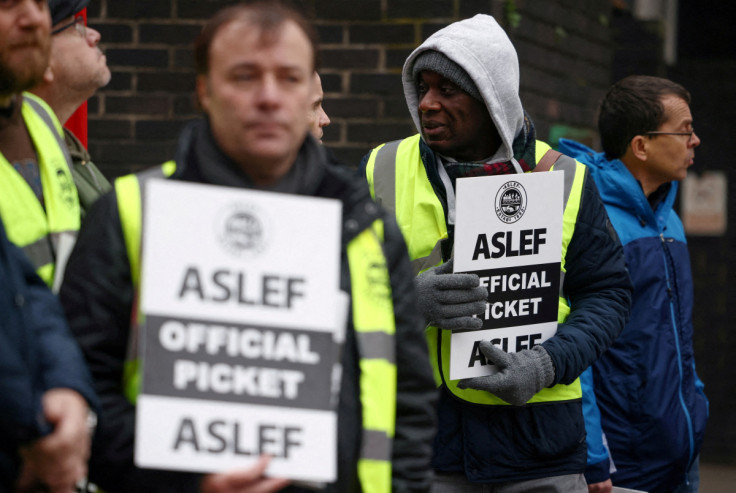ASLEF's Planned Walk-Outs Bring Disruption for Train Passengers Across England
The strikes, orchestrated by the train drivers' union ASLEF, are set to unfold as a series of "rolling" walk-outs from late January to early February.

In a concerning development for commuters and the rail industry, nationwide rail strikes in England have entered their third consecutive year, as train drivers belonging to ASLEF plan a series of rolling walk-outs between January 30 and February 6.
This disruptive action is set to impact millions of passengers, with thousands of trains likely to be cancelled each day. The strikes are strategically designed to cause maximum disruption over an extended period, with a nine-day ban on overtime further exacerbating the situation.
The strike schedule includes region-by-region stoppages, starting with an overtime ban from January 29 to February 6. The strikes will then unfold as follows:
- January 30: Strikes on South Western Railway, Southeastern, Southern, Gatwick Express, Great Northern and Thameslink
- January 31: Strikes on Northern and TransPennine Express
- February 1: Overtime ban continues
- February 2: Strikes on Greater Anglia, C2C and LNER
- February 3: Strikes on West Midlands Trains, Avanti West Coast and East Midlands Railway
- February 4: Overtime ban continues
- February 5: Strikes on Great Western, CrossCountry and Chiltern
- February 6: Overtime ban concludes
The most disruptive day is anticipated to be January 29, targeting commuters in southeast England, while intercity travellers will face the brunt on February 2 and 3, affecting main operators on the East Coast and West Coast main lines, as well as the Midland mainline. The ban on rest-day working is expected to cause significant disruption on February 4.
ASLEF, the train drivers' union, argues that no train operator employs sufficient drivers to fulfil their service commitments without requiring drivers to work on their days off. The union has been engaged in a dispute with 14 train operators, including major commuter and intercity companies, since the summer of 2022.
Additionally, ASLEF's primary demands include a no-strings pay increase followed by negotiations at a local level to modernise working practices.
The Rail Delivery Group (RDG), representing train operators, insists that any pay increase is contingent on significant reforms. All agreements resulting from negotiations will be subject to approval by the Department for Transport (DfT), with taxpayers expected to bear the financial burden.
Notably, ticket revenue remains approximately one-fifth lower than pre-COVID levels, and the public subsidy to sustain the railway has surged to £17,600 per minute – £5,300 more than pre-pandemic levels.
To mitigate the impact of the strikes, the transport secretary, Mark Harper, has the option to implement "minimum service levels" (MSLs) using new legislation. The DfT defines MSLs as providing the equivalent of 40 per cent of the timetabled services during the strike period. However, concerns have been raised by the Transport Select Committee about the potential risks associated with MSLs.
Iain Stewart, the Conservative chair of the committee, warned that implementing MSLs hastily could worsen worker-employer relations, potentially making services less reliable. This apprehension underscores the complexity of finding a balanced solution that addresses the grievances of both the union and the train operators.
ASLEF's general secretary, Mick Whelan, expressed disappointment at the lack of communication with the government and employers, asserting that train drivers have not received a pay increase in half a decade. Whelan highlighted the commitment of train drivers during the COVID-19 pandemic, working as key workers without requesting pay increases.
Whelan criticised the government's introduction of the minimum service levels legislation, suggesting that it may exacerbate rather than ease industrial strife. He called on the government and train operating companies to engage in meaningful negotiations to resolve the dispute and collaboratively secure the future of the railways.
A spokesperson for the Rail Delivery Group emphasised the negative consequences of strikes on lives and livelihoods, particularly during a time when taxpayers contribute an additional £54 million per week to support post-Covid rail services. The spokesperson detailed an offer to drivers that would raise base salaries to nearly £65,000 for a four-day week without overtime, surpassing the national average.
They said: "Nobody wins when strikes impact lives and livelihoods, and they're particularly difficult to justify at a time when taxpayers are continuing to contribute an extra £54m a week to keep services running post-Covid...
"Instead of staging more damaging industrial action, we call on the ASLEF leadership to work with us to resolve this dispute and deliver a fair deal which both rewards our people and makes the changes needed to make services more reliable."
The Rail Delivery Group urged ASLEF's leadership to collaborate in resolving the dispute, emphasising the need for a fair deal that rewards employees while implementing necessary changes to enhance service reliability.
Meanwhile, the Department for Transport expressed disappointment at ASLEF's decision to continue targeting commuters, accentuating the impact on those travelling for work, school or essential medical appointments by train.
© Copyright IBTimes 2025. All rights reserved.





















